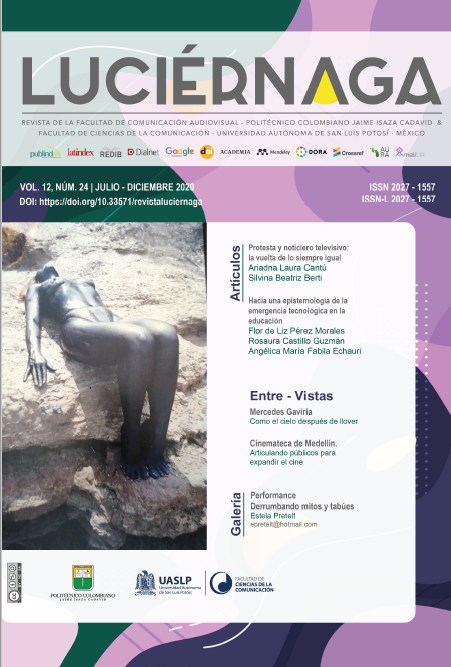Theoretical Approaches to the Relationship between State, Media, and Audiences: Spain, Russia and China
DOI:
https://doi.org/10.33571/revistaluciernaga.v12n24a6Keywords:
Press, journalism, media, public, StateAbstract
This bibliographic review provides theoretical elements for the analysis of the complexity of the relationship between the media, the state, and the audiences. It allows thinking about the communicative dynamics in post-Franco Spain, post-Soviet Russia and the China of transition economy based on merchandise and international openness.
Article Metrics
Abstract: 395 PDF (Español (España)): 218 HTML (Español (España)): 40PlumX metrics
References
Barrera, C. & Zugasti, R. (2006), “The role of the press in time of transition: the building of the Spanish democracy 1975-1978”, en Voltmer, K. Mass Media and Political Communication in New Democracy, New York: Routledge.
Chan, J. M. & Qui, J. L. (2002), “China: media liberalization under authoritarianism”, en Price & Rozumilowicz, Media Reform. Democratizing the media, democratizing the state, London: Routledge.
Curran, J. & Jin Park, M. (2000), De-Westernizing Media Studies, New York: Routledge
Downing, J. D. H. (1996), Internationalizing Media Theory. Transition, Power, Culture, London: SAGE Publications.
Esser, F. & Pfetsch, B. (2004), Comparing Political Communication. Theories, Cases, and Challenges, United Kingdom: Cambridge University Press.
Glenn III, J. K. (2001), Framing Democracy. Civil Society and Civic Movements in Eastern Europe, Stanford, California: Stanford University Press.
Gross, P. & Jakubowicz, K. (2013), Media Transformations in the Post-Communist World. Eastern Europe’s Tortured Path to Change, United Kingdom: Lexington Books.
Gunther, R. & Mughan, A. (2000), Democracy and the Media. A Comparative Perspective, United Kingdom: Cambridge University Press (CUP).
Hallin, D. & Mancini, P. (2012), Comparing Media Systems beyond the Western World, United Kingdom: Cambridge University Press (CUP).
Hallin, D. & Mancini, P. (2007), Sistemas Mediáticos Comparados, Barcelona: Editorial Hacer.
Hedwig de Smaele, (2006), “In the name of democracy: the paradox of democracy and press freedom in post-communist Russia”, en Voltmer, K, Mass Media and Political Communication in New Democracies, New York: Routledge.
Lugo-Ocando, J. & García Santamaría, S. (2015), “Media, Hegemony and Polarization in Latin America”, en Zielonka, J. (2015).
Vartanova, E. (2012), “The Russian Media Model in the Context of Post-Soviet Dynamics”, en Hallin, D. & Mancini, P. (2012).
Voltmer, K. (2006), Mass Media and Political Communication in New Democracies, New York: Routledge.
O’Donnell, G. & Schmitter, P. (1994), Transiciones desde un gobierno autoritario. Perspectivas comparadas, Barcelona: Paidós, Vol. 3 y 4.
Price, M. E. & Rozumilowicz, B. & Verhulst (2002), Media Reform. Democratizing the media, democratizing the state, London: Routledge.
Przeworski, A. (1994), “Algunos problemas en el estudio de la transición hacia la democracia”, en O’Donnell, G. y Schmitter, P., Transiciones desde un gobierno autoritario. Perspectivas Comparadas, Barcelona: Paidós, Vol. 3, pp. 79-104.
Meng, B. & Rantanen, T. (2015), “A Change of Lens: A call to compare the media in China and Russia”, Critical Studies in Media Communication, Vol 32, No. 1, pp. 1-15.
Melucci, A. (1999), Acción colectiva, vida cotidiana y democracia, México: El Colegio de México.
Oates, S. (2007), “The Neo-Soviet Model of the Media”, Europe-Asia Studies, Vol. 59, No. 8, Dec, pp. 1279-1297.
Randall, V. (1993), “The Media and Democratization in the Third World,” Third World Quarterly, Vol. 14, No. 3, pp. 625-646.
Reig Cruañes, P. (2014), “La prensa en la transición democrática: ni ‘motor del cambio’ ni ‘parlamento de papel’ ”, en Guillamet, J. & Salgado, F., El periodismo en las transiciones políticas. De la Revolución Portuguesa y la Transición Española a la Primavera Árabe, Madrid: Biblioteca Nueva.
Repnikova, M. (2017), Media, Politics in China: Improvising Power under Authoritarism, United Kingdom: Cambridge University Press.
Roudakova, N. (2012), “Comparing Processes: Media, “Transition”, and Historical Change”, en Hallin, D. & Mancini, P. (2012).
Roudakova, N. (2008), “Media, political clientelism: lessons from anthropology”, Media, Culture & Society, Vol. 30 (1), pp. 41-59.
Tarrow, S. (1997), El poder en movimiento. Los movimientos sociales, la acción colectiva y la política, Madrid: Alianza Editorial.
Tong, J. & Sparks, C. (2009), “Investigative Journalism in China Today”, Journalism Studies, Vol. 10, No. 3, pp. 337-352.
de Smaele, (2013), adrid. .( eds.), El periodismo en las transiciones poltario. Perspectivas comparadas, Barcelona, PaidWinfield, B. H. & Peng, Z. (2005), “Market or Party controls. Chinese Media in Transition”, The International Journal for Communication Studies, SAGE Pub. pp. 255-270
Winfield, B. H. & Peng, Z. (2005), “Market or Party controls. Chinese Media in Transition”, The International Journal for Communication Studies, SAGE Pub. pp. 255-270.
Zao, Yuezhi (2012), “Understanding China’s Media System in a World Historical Context”, en Hallin, D. & Mancini, P. (2012).
Zielonka, Jan (2015), Media and Politics in New Democracies: Europe in a Comparative Perspective, United Kingdom: Oxford University Press.
Published
How to Cite
Issue
Section
License
Copyright (c) 2020 Carlos Manuel Rodríguez Arechavaleta

This work is licensed under a Creative Commons Attribution-NonCommercial-ShareAlike 4.0 International License.
Aquellos autores/as que tengan publicaciones con esta revista, aceptan los términos siguientes:- Los autores/as conservarán sus derechos de autor y garantizarán a la revista el derecho de primera publicación de su obra, el cuál estará simultáneamente sujeto a una licencia de Creative Commons Atribución – No comercial – Compartir igual
que permite a terceros compartir la obra siempre que se indique su autor y su primera publicación en esta revista. - Los autores/as podrán adoptar otros acuerdos de licencia no exclusiva de distribución de la versión de la obra publicada (p. ej.: depositarla en un archivo telemático institucional o publicarla en un volumen monográfico) siempre que se indique la publicación inicial en esta revista.
- Se permite y recomienda a los autores/as difundir su obra a través de Internet (p. ej.: en archivos telemáticos institucionales o en su página web) antes y durante el proceso de envío, lo cual puede producir intercambios interesantes y aumentar las citas de la obra publicada. (Véase El efecto del acceso abierto)
- Luciérnaga-Comunicación no cobra tasas o cargos a Autores o colaradores por la recepción, revisión o publicación de artículos (APC -Article Processing Charges/ publication fee).


















